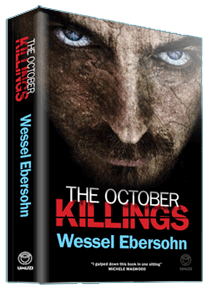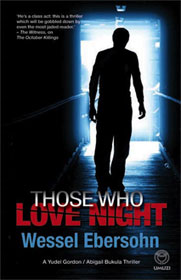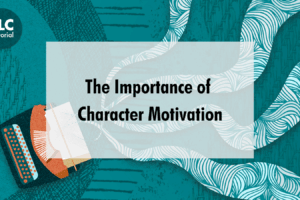
TLC helped author Wessel Ebersohn with his novel, The October Killings. Ebersohn’s new thriller, Those Who Love Night, was published this year. Here is an interview about the new book with Crime Beat at Book Southern Africa.
Ebersohn interview with Crime Beat by Mike Nicol in August 2010
Mike Nicol of Crime Beat interviewed Wessel Ebersohn on THOSE WHO LOVE NIGHT.
Crime Beat: Well, this came as a surprise, although I am not sure exactly why. Perhaps I thought you were intricately tied into the South African scene. But leaving that aside, Those Who Love Night is set in Zimbabwe. Why did you decided to go outside our borders?
The great advantage that an author enjoys when using The Literary Consultancy is the power of an objective and dispassionate view of his or her work from talented and knowledgeable people. The guidance and positive criticism I received from TLC played a major part in the market’s acceptance of The October Killings. I am truly grateful for the help given to me.
Wessel Ebersohn, The October Killings , Umuzi
Wessel Ebersohn: I have been fascinated by Zimbabwe and its travails for a long time. A well-ordered society is better for its citizens in every way, but it is not very stimulating. I recently spent a few weeks in Europe. I found much there that is interesting and beautiful, but not much to get the pulse racing. The chaos that is Zimbabwe, borne out by our own visits to that country, is a naturally exciting background for a thriller, not always the easiest or safest place to research though.
Crime Beat: You visited the country? In what way was conducting research difficult?
Wessel Ebersohn: Writers trying to get the real picture of Zimbabwe are always tense while in that country. Shortly before one of our visits, while working on Those Who Love Night, a Johannesburg-based journalist had fled the country. She found it necessary to travel via Zambia to throw the dogs off the scent. You are always aware that you are in a dictatorship and doing things of which the government would not approve. Not only that, but you are aware that you could be drawing unwelcome attention to the people you meet. For instance, we visited friends whose offices the Zanu PF headquarters looks down on. Passing through seemingly endless farmlands that had once been worked by white farmers, but are now lying fallow, also does little for the state of mind. The road blocks too are reminder of where you are. We were shaken down for US$50 by the police at one of them, but that was something that might happen to any tourist. It had nothing to do with politics and everything to do with opportunism. I took no notes while in the country, relying instead on my memory, which for matters important to me is a good one.

Crime Beat: Zimbabwe is a society in collapse. It is ruled by a neurotic and paranoid despot and this has bred a violent and sinister element in his security services. This is the sort of background you favour in your novels, but I wonder if this is not also a cautionary tale for South Africa?
Wessel Ebersohn: It certainly is a cautionary tale for our country. One has to understand that the leadership of that country do not see their actions as unreasonable. No dictators do. According to the pronouncements of its propagators, the recent attempts to bring the press to heel in South Africa also seems entirely reasonable. What has to be appreciated is that any such step can take the one who makes the decision down a turning in the road that can lead to some altogether unexpected destination. It may also turn out to be almost irreversible, at least for the foreseeable future. When the person or group making such decisions is at the head of a nation the consequences may truly be vast.
Crime Beat: Just to return to the topic of the Ebersohn territory: an iron-fisted state and a citizenry struggling for their rights. Why is this one of your dominant themes?
Wessel Ebersohn: I am enthralled by the struggles that people have when they live under dictatorships. We live in a continent from which many middle-class people – of all races – have fled. I remember something Reverend Beyers Naude said to Miriam, my wife, while I was in hiding finishing Store Up The Anger. She was afraid of being picked up by the security police. He gave her excellent advice, then he said, “But it is exciting, isn’t it?”
Read the whole interview on Wessel Ebersohn’s news page







